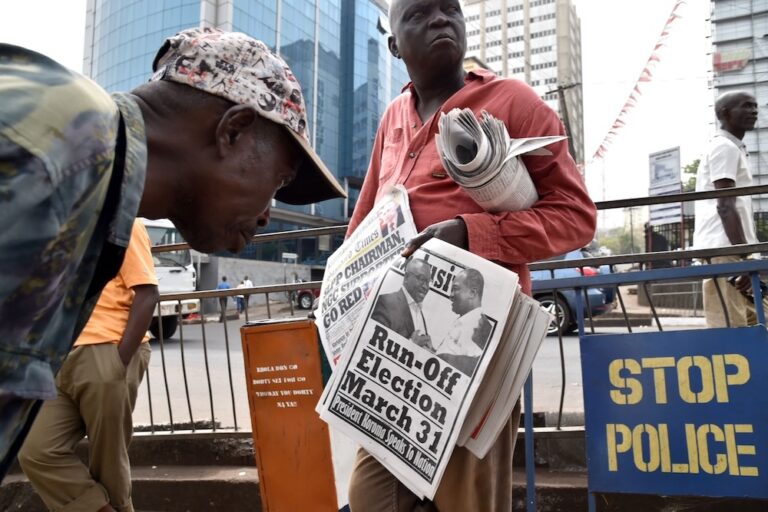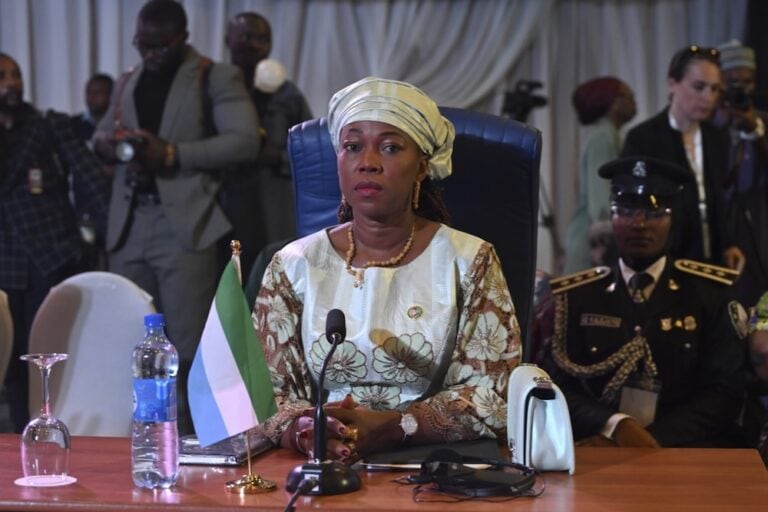(ARTICLE 19/IFEX) -The following is the third submission by ARTICLE 19 to the Government of Sierra Leone on the Independent Media Commission Bill, and the response of the minister of information, communication, tourism and culture to ARTICLE 19’s second submission: THIRD SUBMISSION BY ARTICLE 19 TO THE GOVERNMENT OF SIERRA LEONE ON THE INDEPENDENT MEDIA […]
(ARTICLE 19/IFEX) -The following is the third submission by ARTICLE 19 to
the Government of Sierra Leone on the Independent Media Commission Bill, and
the response of the minister of information, communication, tourism and
culture to ARTICLE 19’s second submission:
THIRD SUBMISSION BY ARTICLE 19 TO THE GOVERNMENT OF SIERRA LEONE ON THE
INDEPENDENT MEDIA COMMISSION BILL, NO. 99 OF 1999
ARTICLE 19 is grateful to the Minister of Information, Communication,
Tourism and Culture for his response of 22 September 1999 to our second
submission to the Government of Sierra Leone on the Independent Media
Commission Bill, No. 99 of 1999, dated 17 September 1999. We would like to
place on record our appreciation of the open and constructive way in which
the Government of Sierra Leone has responded to our submissions. We would
like to make a brief third and final submission which deals with some of the
issues raised by the Minister. Once again, it is addressed directly to the
Minister. As before, with the Minister’s agreement, his response to our
second submission is attached as an annex.
1) You state that our interpretation of the income tax issue is incorrect
and that there has been no targeting of the print media in this regard, as
some have alleged. In fact, while we have noted these allegations, our
concern about the likely effect of the Bill is based on the measurable
actions of the government in including media-specific income tax provisions
in the proposed Bill. We certainly do not dispute your view that all
companies and individuals have an obligation to pay income tax. However, our
position on the income tax issue remains what it was after we met with you
and officials of the Income Tax Department in July 1998: newspaper
proprietors and government should seek a reasonable solution to the dispute
which, while recognizing the right of the government to levy tax, including
arrears, at the same time acknowledges the particular importance of
protecting media pluralism and freedom in a transitional democracy. However,
nowhere in your response of 22 September do you answer our question as to
why the print media justifies the effective – and, in our view,
unnecessary – duplication in the proposed bill of provisions which already
exist under the Income Tax Act. Until this question is answered, we believe
that we have justifiable grounds for anxiety with regard to the motivations
behind the income tax provisions in the Bill.
2) You refute our statement that the Government of Sierra Leone has engaged
in “periodic acts of harassment” of the print media over the past two years
in response to “untrue stories” or stories which threaten national security.
Allow us first to acknowledge that we should have been more precise with
regard to dates. The period in question is February 1998-September 1999. We
recognize that the last 18 months have been extraordinarily difficult ones
for all Sierra Leoneans, including those within the democratically-elected
government. It has been a period in which the threat to national security
has been real. We also recognize that, under existing Sierra Leonean law,
journalists detained for publishing “false reports” (under the Public Order
Act) or “disturbing reports” (under the Public Emergency Regulations) might
well have been convicted had the cases come to court. However, our view is
that the offence of “false reporting” is a hangover from the colonial
period – as, in our view are seditious libel and “insulting the flag”, two
other criminal offences which remain on the statute book in Sierra Leone.
Our position is that any restriction on freedom of expression on national
security grounds should not only be prescribed by law but also must be
necessary in a democratic society with the genuine purpose and demonstrable
effect of protecting a legitimate national security interest. By extension,
only acts or expressions which undermine the territorial integrity or
institutions of the state or pose a grave threat to the safety of its
population by the use or threat of force can be regarded as a national
security interest. National security must be clearly distinguished from
political interests which can never be legitimate grounds for such
restrictions. The offences of “false reporting” and “disturbing reporting”
are vague, ill-defined and provide wide scope for manipulation by political
interests. While it may be the case that some of the journalists in question
may have published stories or facts that were incorrect, unless their
“wrongdoing” met the narrow criteria described above, we do not believe that
their detention and criminal prosecution would in any circumstances have
been justified.1 Accordingly, ARTICLE 19 would be interested to know the
instances of detention of journalists over the past 18 months which could be
justified under the above criteria rather than under existing Sierra Leonean
law. Finally, in this connection, we await with interest the outcome of the
wider review of media laws which you have undertaken over the past 18
months. We very much hope that it will lead to Sierra Leone’s media laws
coming fully into line with international human rights standards.
3) On your disagreement with our claim that the provisions for the
registration of newspapers and magazines are unnecessarily cumbersome, we
refer you to Article 6(1) – (5) of the draft National Law of the Republic of
Indonesia regarding the Press, a copy of which is in your possession. You
will find minimal “technical” provisions for registration in this draft law.
They are expressed in a single Article. We are now informed that the
Indonesian parliament, when passing the final Act, struck out even this
Article. There are now no provisions in Indonesia for the registration of
newspapers and magazines. This state of affairs in Indonesia, whose record
on media freedom has been extremely poor until recently, is in striking
contrast to the provisions contained within your proposed Bill, which
stretch across 14 Articles. Our concern is that unnecessarily cumbersome
registration processes can be used by officials as a “technical” means of
harassing the print media, thereby hindering freedom of expression. This is
common, for example, in The Gambia. Given that you yourself intend to play
an active role in the media as a private person once you have left office,
we hope that you would not wish to place such means at the disposal of less
well-intended governments.
ANNEX
22 September 1999
RESPONSE BY THE MINISTER OF INFORMATION, COMMUNICATION, TOURISM AND CULTURE
TO THE SECOND SUBMISSION BY ARTICLE 19 ON THE INDEPENDENT MEDIA COMMISSION
BILL
I will only make the following comments on your last submission.
1. In the first place, I can assure you that your assumptions about the
objective of the proposed legislation are totally wrong. Let me remind you
that I am a media practitioner myself who only happens to be the Minister of
Information at this point in time. I am not going to remain in Government
indefinitely. I intend to practice my profession when I cease being
Minister. I am therefore acutely aware of the importance of not passing any
legislation that will restrict press freedom or freedom of expression. I
believe if all interested parties bear this fact in mind, the misconceptions
about the objectives of the bill will disappear.
2. In your submission, you say: “There have been persistent allegations that
the government is targeting the print media on the income tax issue over and
above its actions with regard to companies more generally.” I am sorry to
say that basing your position on allegations without ascertaining the facts
is not only unfair but unprofessional. The truth is that some newspapers
have been publishing for several years without paying taxes. I am sure you
are aware that tax evasion is a criminal act. Yet Government has not taken
any punitive action. Unfortunately, the position you continue to take gives
the impression that you are condoning acts of lawlessness by journalists, or
that you believe journalists should be above the law. All other business
people pay their taxes, without which their business licenses do not get
renewed. In fact, several of the newspapers most critical of Government have
no problem with income tax, because they are up to date in their payments.
The problem some newspapers have is that they have not only not been paying
their taxes, they do not have accounting records. I am afraid you are
allowing yourself to be misled by those who thrive in situations of chaos
and want the status quo to continue. The general procedure followed by the
Income Tax Department with all business enterprises is as follows: In the
first place, the proprietor of a business is supposed to submit annual
returns. If he or she fails to do so, then the Income Tax Department makes
an assessment of what they believe is owing, based on rough estimates. If
the individual contests the assessment, he or she then has to submit
statements of accounts for the year showing income and expenditure. The
assessment is then revised based on the figures submitted. In addition, the
individual is not expected to pay all outstanding taxes before a tax
clearance certificate is issued, provided the outstanding amount has been
verified and a payment plan agreed. If you wish to verify this, you can
contact the Income Tax Department.
3. You also say: “The Government of Sierra Leone has engaged in periodic
acts of harassment of the print media over the past two years in response to
what it claims are untrue stories or stories which threaten national
security. In the absence of a properly functioning judiciary, it has
appeared to assign itself the role of sole arbiter in these matters,
although some have claimed that the real arbiter has at times been ECOMOG.
The question arises of whether, through these actions, the government has
been acting to protect the rights of all citizens from abuse, or suppressing
unwelcome or embarrassing information which the people of Sierra Leone have
the right to know about in relation to those in positions of power and
authority.” Let me assure you that in all the cases where journalists have
been arrested by the law enforcement authorities, there was sufficient
evidence to secure a conviction had Government wished to pursue these cases
to their logical conclusion. The cases were dropped because pleas for
clemency were made to Government by the journalists. I must say I find it
very disturbing that you consistently refuse to acknowledge wrongdoing on
the part of journalists. You seem to ignore facts which are so glaring that
the journalists themselves acknowledge them.
4. With regards the requirements for registration of newspapers and
magazines, I really cannot understand what you are calling cumbersome and
how these procedures will hinder freedom of expression. I will repeat that
all proprietors of newspapers or magazines are expected to do is submit
information to the Commission indicating the title of the newspaper which
should not so closely resemble another newspaper in existence that the two
will be mistaken for each other, the name and address of the
proprietor/publisher and also submit proof of absence of tax liability (i.e.
income tax clearance from the Income Tax Department). Every year, they will
be required to submit returns indicating the title of the newspaper and the
name, business address (if any) and residential address of the proprietor.
This is simply to ensure that the records are kept up to date. In fact,
sections 20 1 (b) and 30 (b) will be deleted from the bill. The Attorney
General has pointed out that including these sections in the bill was an
error by the draftsman, since those sections of the constitution are the
enabling powers for the Act itself, not for registering or refusing to
register newspapers or magazines. Perhaps this was what was causing you
disquiet. If so, I hope your fears have been allayed, because I really
cannot see what else is contained in this part of the bill that can be said
to pose a danger to freedom of expression. If however, it is simply the act
of having any procedures at all in place for registration of newspapers and
magazines that you see as posing the danger, then I believe on this one, we
will have to agree to disagree.
5. Finally, I am sure you will be pleased to note that after further
discussion with the Attorney General on section 40, it has been decided that
the Minister will not make regulations by statutory instruments. This
responsibility will be left to the Commission.
1 Our position is based on the Johannesburg Principles on National Security,
Freedom of Expression and Access to Information, which were adopted in 1995
by a group of experts convened by ARTICLE 19 and the Centre for Applied
Legal Studies of the University of the Witwatersrand. These principles are
based on international and regional law and standards relating to the
protection of human rights, evolving state practice and the general
principles of law recognized by the community of nations. The principles
acknowledge the enduring applicability of the 1984 Siracusa Principles on
the Limitation and Derogation Provisions in the International Covenant on
Civil and Political Rights and the Paris Minimum Standards of Human Rights
Norms in a State of Emergency, also adopted in 1984. The Johannesburg
Principles have been endorsed by the UN Special Rapporteur on Freedom of
Opinion and Expression, Mr Abid Hussain.


